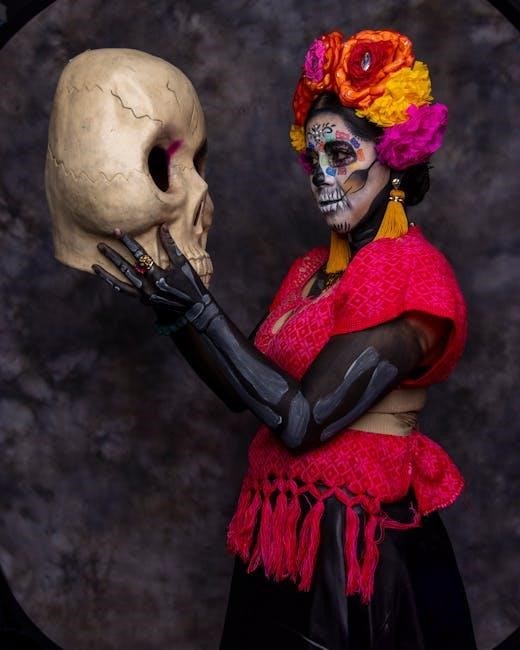Gonzalo Vega’s “El Valor de la Mujer” is a meaningful exploration of women’s roles‚ highlighting their societal contributions and challenging gender stereotypes through a nuanced perspective.
Overview of the Book and Its Significance
El Valor de la Mujer by Gonzalo Vega Monroy‚ published in 2002‚ is a thought-provoking work that delves into the societal and cultural perceptions of women’s roles. The book emphasizes the importance of recognizing women’s contributions to society‚ challenging traditional gender stereotypes‚ and advocating for gender equality. Through historical and contemporary perspectives‚ Vega highlights the resilience and strength of women‚ drawing parallels to figures like Manuela Medina‚ a symbol of female empowerment. The text encourages readers to reflect on the value of women in both personal and collective contexts‚ fostering a deeper understanding of their impact on communities and history. This work remains relevant in modern discussions about gender roles and equality.

The Author’s Perspective on Women’s Roles in Society
Gonzalo Vega‚ in El Valor de la Mujer‚ presents a compelling perspective on women’s roles‚ emphasizing their strength and resilience in overcoming societal challenges. He highlights how women have historically been undervalued despite their significant contributions to families‚ communities‚ and revolutions. Vega advocates for a shift in perception‚ recognizing women as equals and celebrating their unique abilities and leadership. His work challenges traditional gender stereotypes‚ urging readers to acknowledge the intrinsic value of women in shaping a more equitable society. Through this lens‚ Vega fosters a deeper understanding of women’s importance in both historical and contemporary contexts.

Historical Context of Women’s Value in Literature
Spanish Golden Age authors like Lope de Vega often portrayed women as symbols of strength and resilience‚ reflecting societal views of their roles in history and culture.
Lope de Vega’s Portrayal of Women in Spanish Literature
Lope de Vega’s works often highlighted women’s strength and resilience‚ portraying them as central figures in his plays. His characters were frequently strong‚ independent‚ and capable of defying societal norms‚ showcasing their intellectual and emotional depth. This portrayal reflected the historical context of women’s roles in Spanish society‚ where they were often confined yet found ways to exert influence. Through his writing‚ Lope de Vega acknowledged the value of women in both public and private spheres‚ challenging gender stereotypes and emphasizing their contributions to culture and family. His depictions remain significant‚ offering insights into the evolving perception of women’s roles during the Spanish Golden Age.
Women as Symbols of Strength and Resilience in Historical Texts
Historical texts often depict women as symbols of strength and resilience‚ showcasing their ability to overcome adversity and inspire societal change. Figures like Manuela Medina and Doña Juana exemplify this‚ as they emerged as leaders during revolutions and social movements. Their stories highlight women’s capacity for courage‚ adaptability‚ and determination in the face of oppression. These portrayals emphasize the enduring value of women’s contributions‚ not only in their personal struggles but also in broader cultural and political landscapes. By celebrating their resilience‚ historical narratives underscore the importance of recognizing women’s roles in shaping societies and fostering progress. Their legacies continue to inspire future generations.
The Societal Perception of Women’s Contributions
Society increasingly recognizes women’s contributions‚ moving beyond traditional roles to acknowledge their impact in leadership‚ innovation‚ and cultural advancement‚ while addressing ongoing challenges to true equality and representation.
Women’s Participation in Revolutions and Social Movements
Women have played pivotal roles in revolutions and social movements‚ challenging gender norms and demonstrating leadership. Figures like Manuela Medina and Doña Juana exemplify their influence‚ reshaping history through courage and resilience. Their contributions‚ often overlooked‚ highlight the strength women bring to societal change. Gonzalo Vega’s work underscores their value‚ emphasizing how they’ve driven progress despite systemic barriers. These women’s stories inspire contemporary movements‚ proving their impact endures; By recognizing their historical roles‚ we honor their legacy and continue the fight for equality‚ ensuring their contributions remain central to future struggles for justice and empowerment.
Challenges Faced by Women in Achieving Recognition
Women have historically faced significant barriers in gaining recognition for their contributions‚ often due to societal undervaluation of their roles. Gonzalo Vega highlights how women’s work‚ particularly in caregiving and community-building‚ is frequently overlooked; Systemic gender biases and stereotypes perpetuate this invisibility‚ dismissing their achievements as less important than those of men. Even in revolutionary contexts‚ women’s leadership is often marginalized‚ as seen in the stories of Manuela Medina and Doña Juana‚ whose impact was initially underappreciated. Vega’s work emphasizes the need to challenge these norms and acknowledge women’s invaluable roles in shaping societies and driving progress‚ fostering a more equitable recognition of their contributions.

Cultural and Literary Representations of Women
Gonzalo Vega’s work explores women’s cultural and literary portrayals‚ emphasizing their strength and resilience. His writings challenge stereotypes‚ highlighting women’s pivotal roles in shaping societal values and narratives historically.
The Role of Women in Lope de Vega’s Works
Lope de Vega’s works often portray women as strong‚ independent figures‚ challenging traditional gender roles. His female characters embody resilience and agency‚ reflecting their societal contributions. These portrayals emphasize women’s value beyond domestic roles‚ highlighting their intellectual and emotional depth. By giving women active roles in his stories‚ Lope de Vega underscores their importance in shaping cultural and literary narratives. His works resonate with Gonzalo Vega’s themes‚ celebrating women’s multifaceted identities and their impact on society. This literary representation not only honors women’s strengths but also encourages a broader recognition of their value in historical and contemporary contexts.

Cultural Icons and Their Impact on Gender Perceptions

Cultural icons have long shaped perceptions of gender‚ often challenging traditional roles. Figures like Manuela Medina‚ celebrated for her leadership‚ inspire a reevaluation of women’s roles in society. Lope de Vega’s portrayal of strong female characters emphasizes their resilience and intellectual depth. These cultural icons symbolize strength and independence‚ influencing gender equality discussions. By highlighting women’s contributions‚ they challenge stereotypes and foster empowerment‚ promoting a more inclusive understanding of gender roles. Such representations not only honor women’s value but also encourage societal change‚ reflecting Gonzalo Vega’s themes of women’s worth and their enduring impact on culture and identity.
Modern Relevance of the Book’s Message
Gonzalo Vega’s “El Valor de la Mujer” resonates today by highlighting women’s contributions and challenging gender stereotypes‚ fostering contemporary discussions on equality and empowerment in society.
Contemporary Discussions on Gender Equality
Gonzalo Vega’s “El Valor de la Mujer” sparks timely conversations about gender equality‚ emphasizing women’s contributions and challenging stereotypes. The book highlights how societal perceptions of women’s roles have evolved‚ yet barriers remain. By advocating for equal opportunities and recognition‚ Vega’s work aligns with modern feminist movements. It underscores the importance of empowering women in all spheres‚ from education to leadership‚ fostering a more inclusive society. The text also resonates with global discussions on breaking gender biases and promoting equity‚ making it a relevant resource for understanding and addressing contemporary gender issues. Its message continues to inspire dialogue and action toward a more equitable world.
How “El Valor de la Mujer” Resonates Today

Gonzalo Vega’s “El Valor de la Mujer” continues to resonate today by emphasizing the enduring value of women in society. The book challenges outdated stereotypes and highlights the importance of gender equality in modern times. Its themes of female strength and resilience align with contemporary movements advocating for women’s rights and empowerment. By celebrating women’s contributions across various domains‚ the text inspires reflection on the progress made and the challenges still faced. It serves as a reminder of the necessity to recognize and appreciate women’s roles in fostering a more equitable and inclusive world. The book’s message remains a powerful call for change and appreciation in today’s society.
Gonzalo Vega’s “El Valor de la Mujer” leaves a lasting impact by celebrating women’s intrinsic worth and advocating for gender equality‚ inspiring future generations to embrace their value.
The Enduring Legacy of Gonzalo Vega’s Work
Gonzalo Vega’s “El Valor de la Mujer” has left an indelible mark on literature by challenging gender stereotypes and celebrating women’s contributions to society. His work emphasizes the intrinsic value of women‚ highlighting their strength‚ resilience‚ and pivotal roles in history and culture. Vega’s perspective not only reflects the historical significance of women but also inspires contemporary discussions on gender equality. By shedding light on the often-overlooked achievements of women‚ his writing fosters a deeper understanding of their impact on societal progress. The legacy of his work lies in its ability to resonate across generations‚ continuing to empower women and promote a more equitable view of gender roles in modern times.
Call to Action for Continued Empowerment of Women
Gonzalo Vega’s work serves as a powerful reminder of the importance of empowering women in all aspects of society. By recognizing their value and contributions‚ we can fostering greater gender equality. Education‚ advocacy‚ and community engagement are essential tools to challenge stereotypes and promote women’s rights. Vega’s insights encourage us to support women in leadership roles and celebrate their achievements. Together‚ we can build a future where women’s voices are heard and their potential is fully realized. Let us continue to draw inspiration from Vega’s message‚ striving for a world where women are valued and empowered to thrive.